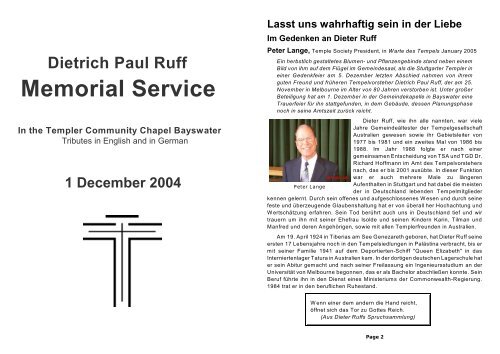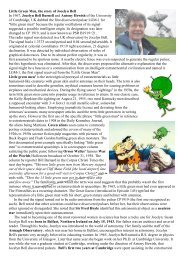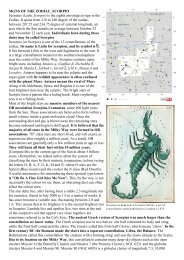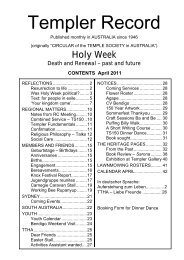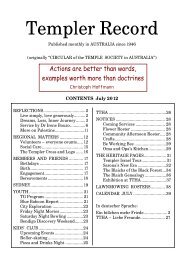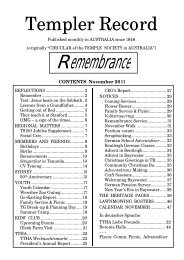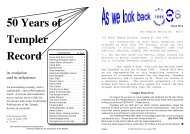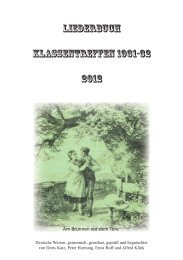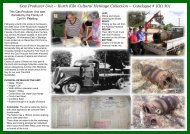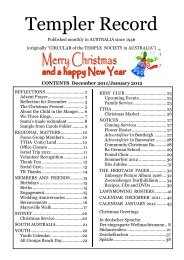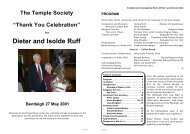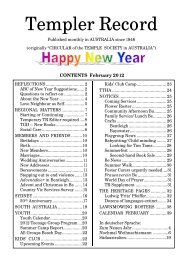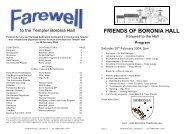Dietrich Paul Ruff Memorial Service In the Templer Community ...
Dietrich Paul Ruff Memorial Service In the Templer Community ...
Dietrich Paul Ruff Memorial Service In the Templer Community ...
Create successful ePaper yourself
Turn your PDF publications into a flip-book with our unique Google optimized e-Paper software.
<strong>Dietrich</strong> <strong>Paul</strong> <strong>Ruff</strong><br />
<strong>Memorial</strong> <strong>Service</strong><br />
<strong>In</strong> <strong>the</strong> <strong>Templer</strong> <strong>Community</strong> Chapel Bayswater<br />
Tributes in English and in German<br />
1 December 2004<br />
Lasst uns wahrhaftig sein in der Liebe<br />
Im Gedenken an Dieter <strong>Ruff</strong><br />
Peter Lange, Temple Society President, in Warte des Tempels January 2005<br />
Ein herbstlich gestaltetes Blumen- und Pflanzengebinde stand neben einem<br />
Bild von ihm auf dem Flügel im Gemeindesaal, als die Stuttgarter <strong>Templer</strong> in<br />
einer Gedenkfeier am 5. Dezember letzten Abschied nahmen von ihrem<br />
guten Freund und früheren Tempelvorsteher <strong>Dietrich</strong> <strong>Paul</strong> <strong>Ruff</strong>, der am 25.<br />
November in Melbourne im Alter von 80 Jahren verstorben ist. Unter großer<br />
Beteiligung hat am 1. Dezember in der Gemeindekapelle in Bayswater eine<br />
Trauerfeier für ihn stattgefunden, in dem Gebäude, dessen Planungsphase<br />
noch in seine Amtszeit zurück reicht.<br />
Dieter <strong>Ruff</strong>, wie ihn alle nannten, war viele<br />
Jahre Gemeindeältester der Tempelgesellschaft<br />
Australien gewesen sowie ihr Gebietsleiter von<br />
1977 bis 1981 und ein zweites Mal von 1986 bis<br />
1988. Im Jahr 1988 folgte er nach einer<br />
gemeinsamen Entscheidung von TSA und TGD Dr.<br />
Richard Hoffmann im Amt des Tempelvorstehers<br />
nach, das er bis 2001 ausübte. <strong>In</strong> dieser Funktion<br />
war er auch mehrere Male zu längeren<br />
Peter Lange<br />
Aufenthalten in Stuttgart und hat dabei die meisten<br />
der in Deutschland lebenden Tempelmitglieder<br />
kennen gelernt. Durch sein offenes und aufgeschlossenes W esen und durch seine<br />
feste und überzeugende Glaubenshaltung hat er von überall her Hochachtung und<br />
W ertschätzung erfahren. Sein Tod berührt auch uns in Deutschland tief und wir<br />
trauern um ihn mit seiner Ehefrau Isolde und seinen Kindern Karin, Tilman und<br />
Manfred und deren Angehörigen, sowie mit allen <strong>Templer</strong>freunden in Australien.<br />
Am 19. April 1924 in Tiberias am See Genezareth geboren, hat Dieter <strong>Ruff</strong> seine<br />
ersten 17 Lebensjahre noch in den Tempelsiedlungen in Palästina verbracht, bis er<br />
m it seiner Familie 1941 auf dem Deportierten-Schiff "Queen Elizabeth" in das<br />
<strong>In</strong>terniertenlager Tatura in Australien kam. <strong>In</strong> der dortigen deutschen Lagerschule hat<br />
er sein Abitur gemacht und nach seiner Freilassung ein <strong>In</strong>genieursstudium an der<br />
Universität von Melbourne begonnen, das er als Bachelor abschließen konnte. Sein<br />
Beruf führte ihn in den Dienst eines Ministeriums der Commonwealth-Regierung.<br />
1984 trat er in den beruflichen Ruhestand.<br />
W enn einer dem andern die Hand reicht,<br />
öffnet sich das Tor zu Gottes Reich.<br />
(Aus Dieter <strong>Ruff</strong>s Spruchsammlung)<br />
Page 2
1960 traf ihn ein harter Schicksalsschlag, als seine junge Ehefrau Irene durch<br />
einen unverschuldeten Autounfall ums Leben kam und drei kleine Kinder hinterließ<br />
(das jüngste erst 8 Monate alt). Trotz des schmerzlichen Verlustes fand er die Kraft,<br />
diese Prüfung seines Lebens zu bestehen und einige Jahre später m it einer<br />
Schulfreundin aus Haifa, Isolde Frank, eine zweite Ehe einzugehen, die ihm innere<br />
Bereicherung und Erfüllung brachte. Ohne diese treue Lebensgefährtin hätte er so<br />
manche Aufgabe nicht meistern können, die ihn im weiteren Leben erwartete.<br />
Isolde & Dieter <strong>Ruff</strong> at <strong>the</strong> TSA 'Thank-You Fest' in Bentleigh, M ay 2001<br />
Der Schwerpunkt seines Lebens lag in seinem Einsatz und seiner Aufbauarbeit<br />
für die Tempelgesellschaft. Und diese Arbeit war vielfältig. Ich habe ihn erlebt, wie<br />
er sich um die Ausrichtung von Ferienfreizeiten der Jugendlichen kümmerte; ich habe<br />
ihn unzählige Male am Rednerpult in den Gemeindehäusern stehen sehen; er hat<br />
Trauungen gehalten, Konfirmandenstunden gegeben, junge Mitglieder zur Mitarbeit<br />
in Gemeinde und Gottesdienst motiviert; er war mit Redaktionsarbeit befasst und hat<br />
Kontakte zu anderen Kirchen seiner Um gebung gepflegt. Die Aufzählung seiner<br />
Tätigkeiten für die Gemeinschaft muss notgedrungen unvollständig bleiben, keiner<br />
von uns kann wirklich ermessen, was Dieter <strong>Ruff</strong> in den vielen Jahren im "Dienst am<br />
Nächsten" alles ausgeführt hat.<br />
Er sah, dass wir Menschen ein großes Potenzial in uns tragen und viel erreichen<br />
können, wenn wir bereit sind, zusammenzuwirken. Er ist deshalb unermüdlich dafür<br />
eingetreten, dass unser Verständnis füreinander und unser Aufeinander-Eingehen<br />
ständig neu erprobt wird. Er hat dies auch selber vorgelebt, indem er für jeden ein<br />
offenes Ohr hatte und seinen jeweiligen Gesprächspartner ernst nahm, indem er<br />
Page 3<br />
Ruhe und Gelassenheit ausstrahlte und nicht dazu beitrug, dass Emotionen die<br />
Oberhand gewannen.<br />
Schlägt dir die Hoffnung fehl,<br />
nie fehle dir das Hoffen.<br />
Ein Tor ist zugetan,<br />
doch t a u s e n d stehn noch offen.<br />
(Aus Dieter <strong>Ruff</strong>s Spruchsammlung)<br />
Zwei Schwerpunkte seiner Arbeit der letzten fünf Jahre verdienen, besonders<br />
hervorgehoben zu werden: die Arbeit und sachkundige Gestaltung einer neuen<br />
Bibeltextauswahl für die Tempelgemeinden und die Abfassung einer Gemeinsamen<br />
Erklärung von TSA und TGD zum Glauben der <strong>Templer</strong>. Er hatte den unschätzbaren<br />
Vorteil, dass er Deutsch und Englisch gleich gut beherrschte und damit sprachliche<br />
Verständnisschwierigkeiten zwischen den weit auseinander lebenden <strong>Templer</strong>n<br />
vermeiden oder aber ausgleichen konnte. Auch anderes Schrifttum, das in der TSA<br />
in seiner Amtszeit entstand, wie zum Beispiel das neue <strong>Templer</strong> Hymnbook, ist von<br />
seinem Geist und seiner Lebenseinstellung durchdrungen gewesen.<br />
Eine große W ichtigkeit hatte für ihn die Frage, wie eine Verbindung zwischen den<br />
beiden Tempelgebieten auf Dauer ermöglicht werden könnte. Er war der<br />
Überzeugung, dass diese Verbindung nur durch ein Einander-Kennenlernen und<br />
einen persönlichen Erfahrungsaustausch gewährleistet würde, und wurde damit der<br />
Auslöser dafür, dass jetzt regelmäßig finanziell unterstützte gegenseitige<br />
Besuchsreisen von Ältesten und Gemeindeverantwortlichen zwischen TSA und TGD<br />
stattfinden.<br />
Doch die Bedeutung seines Lebens ist vielleicht nicht so sehr daran zu messen,<br />
was er im Einzelnen getan hat, sondern was er seinen Mitmenschen war. So wie ich<br />
ihn kannte, ging es ihm stets darum, dass man das, was man als wahr erkannt und<br />
empfunden hat, auch im Reden und Handeln zum Ausdruck bringt. Und er hat selbst<br />
danach gelebt. Ich denke, dass jeder von uns diese Wahrhaftigkeit in seinem Leben<br />
wahrnehmen konnte. Es bestand keine Kluft zwischen dem, was er dachte, und dem,<br />
was er tat. Immer ist er mit seiner ganzen Persönlichkeit hinter dem gestanden, was<br />
er sagte. Für mich war er das leuchtende Vorbild eines wahrhaftigen Menschen. Und<br />
so ist auch das W ort aus dem Epheserbrief (4,15) als Leitmotiv über der Stuttgarter<br />
Gedenkfeier gestanden: Lasst uns wahrhaftig sein in der Liebe.<br />
Auf andere Menschen konnte er immer auf eine W eise einwirken, dass sie sich<br />
ernst genommen, verstanden und beraten gefühlt haben. Das gilt besonders für sein<br />
Einwirken auf Jüngere in der Gemeinde. Mark Herrmann, Geschäftsführer der TSA,<br />
sagte in seiner Traueransprache, dass Dieter für ihn der wahre Lehrmeister gewesen<br />
sei. Er habe ihm Lebenshilfe gegeben und Vertrauen in ihn gesetzt. Sicher können<br />
Page 4
das auch viele andere seiner Altersstufe für sich sagen. Ich denke, wir alle haben ihm<br />
viel zu verdanken.<br />
<strong>In</strong> vielen Nachrufen ist das Wesentliche der Persönlichkeit von Dieter <strong>Ruff</strong><br />
hervorgehoben worden. Der Gebietsleiter der TSA, Rolf Beilharz, urteilte, dass Dieter<br />
immer mit innerer Autorität gesprochen habe, er habe – biblisch ausgedrückt – "mit<br />
Vollmacht" gelehrt. Um Probleme anzugehen, habe er Vernunft eingesetzt, und um<br />
sie zu lösen, Weisheit. Er sei ruhig und selbstgenügsam gewesen, habe sich nie in<br />
den Vordergrund gedrängt oder mit seiner Stimme Eindruck machen wollen. Er sei<br />
"der vollkommenste <strong>Templer</strong>" gewesen, den er gekannt habe.<br />
W enn ich das W esen von Dieter <strong>Ruff</strong> nochmals zusammenfassend<br />
charakterisieren wollte, dann vielleicht so: er war ein aufrechter, ehrlicher, geduldiger,<br />
bescheidener, selbstloser und gütiger, im Ganzen gesehen ein absolut integerer<br />
Mensch. Mit ihm verliert unsere Gemeinschaft eine große Führerpersönlichkeit. Er<br />
hat uns in seiner jederzeit hilfsbereiten Art gezeigt, was es heißt, ein <strong>Templer</strong> zu sein.<br />
Er hat sich um den Tempel verdient gemacht.<br />
Bei unserer Gedenkfeier im Degerlocher Gemeindesaal haben wir das Lied<br />
gesungen:<br />
"Aus deiner Hand, Vater, nehm ich diesen Tag<br />
und danke dir, dass du ihn gibst.<br />
Du bist bei mir, was immer kommen mag.<br />
Du trägst und hältst, weil du mich liebst."<br />
W enn ich davon ausgehe, dass wir mit diesen W orten nicht nur für einen<br />
einzelnen Tag, sondern auch für unser ganzes Leben Dankbarkeit empfinden<br />
können, dann glaube ich, dass auch Dieter <strong>Ruff</strong> mit vollem Herzen in diese Liedverse<br />
eingestimmt hätte. �<br />
Page 5<br />
Dieter loved <strong>the</strong> bush and native flowers<br />
Page 6
The Day of <strong>the</strong> Funeral <strong>Service</strong><br />
in <strong>the</strong> <strong>Community</strong> Chapel � Bayswater - 1 December 2004<br />
<strong>In</strong>troductory music: CD – ‘Da Pacem Domine’ (Give Peace, Lord)<br />
Mark Herrmann, Elder of <strong>the</strong> Temple Society Australia<br />
Special music for a special man on a special occasion.<br />
The soul would have no rainbow had <strong>the</strong> eyes no tears.<br />
Good afternoon. On behalf of <strong>the</strong> family, I welcome you, in honouring <strong>the</strong> memory<br />
of Dieter <strong>Ruff</strong>, to reflect on his full and faithful, sincere and selfless life and service.<br />
As an Elder of <strong>the</strong> Temple Society Australia, I, Mark Herrmann, stand before you<br />
today with deep respect for <strong>the</strong> man who assisted and guided me, showed and taught<br />
m e so much, was a trusted confidant and was prepared to reciprocally place great<br />
faith in me, who always had or would make time for me. Dieter was a true mentor to<br />
me and many of my generation, not just because of what he achieved – although this<br />
was immense – but, significantly, due to <strong>the</strong> fashion in which he carried himself and<br />
undertook his multitude of tasks and challenges.<br />
This memorial service will comprise personal reflections, contributions from <strong>the</strong><br />
family and <strong>the</strong> <strong>Templer</strong> Choir, and words from <strong>the</strong> TSA Regional Head in<br />
representing both regions of <strong>the</strong> Temple Society. W ith so much material at hand and<br />
so m uch we all want to say and share, it has been more a matter of what can we<br />
afford to leave out, ra<strong>the</strong>r than what should we include.<br />
It is said that in <strong>the</strong> end <strong>the</strong>se things matter most: How well did you love? How<br />
fully did you live? How deeply did you learn to let go?<br />
W e are ga<strong>the</strong>red today in <strong>the</strong> bonds of true community spirit to offer our love,<br />
comfort and support to you, Isolde, Dieter’s loyal and caring wife; <strong>the</strong>ir children: Karin<br />
with husband Thomas and sons Sasha and Linden; Tilman with wife Charlotte and<br />
children <strong>In</strong>grid and Kristian; and Manfred with wife Anna and son Arion. Manfred is<br />
presently in Thailand and unable to be with us today. A few weeks ago, during a short<br />
return visit to Australia, Manfred said his final goodbyes to his fa<strong>the</strong>r. Granddaughter<br />
<strong>In</strong>grid is also in Asia as part of her university medical course. Our sympathies reach<br />
and envelop <strong>the</strong>m both at <strong>the</strong>ir time of loss. Our thoughts also extend to Dieter’s older<br />
sister Elfriede and her family, as well as <strong>the</strong> wider circle of relatives and friends.<br />
Hymn: ‘Befiehl du deine W ege’ 'Commit whatever grieves you'<br />
Please remain seated and feel free to sing in ei<strong>the</strong>r German or English. It is number<br />
15 in <strong>the</strong> <strong>Templer</strong> Hymnbook and we shall sing verses 1,2,3,4 and 8.<br />
As a contemplation of Dieter’s lifespan I would like to take you on his journey. It<br />
is a fruitful, rewarding and fascinating journey. <strong>In</strong> this spirit we can look back on this<br />
full life of endeavour and accomplishment, of special times and occasions, and smile,<br />
nod knowingly, give thanks and, above all, celebrate. As a celebration of a full 80<br />
years of life, <strong>the</strong>re will need to be gaps (simply for reasons of time), but I am sure that<br />
Page 7<br />
you will all have your own reminiscences to complement what will be mentioned<br />
today.<br />
Familiar nam es will appear and reappear as <strong>the</strong> respective life paths regularly<br />
meet, intersect or run in parallel, like <strong>the</strong> different coloured threads of a large tapestry<br />
contributing to create a beautiful work. The bonds of friendship are strong and<br />
enduring. I am appreciative of <strong>the</strong> time given by family members and friends in<br />
providing me with <strong>the</strong>ir thoughts and memories.<br />
th<br />
<strong>Dietrich</strong> (Dieter) <strong>Ruff</strong> was born on <strong>the</strong> 19 of April 1924 in Tiberias (on <strong>the</strong> shores<br />
of <strong>the</strong> Sea of Galilee) as <strong>the</strong> second child of Alfred <strong>Ruff</strong> and Anna née Kraiss. His<br />
sister Elfriede (Friedel) was already 8 years old.<br />
Elisabeth Wagner at <strong>the</strong> piano, with Mark Herrmann<br />
Members of <strong>the</strong> Temple Society, a Christian group with origins in sou<strong>the</strong>rn<br />
Germany, had migrated to Palestine from <strong>the</strong> late 1860s to establish communities of<br />
like-minded people living an active Christianity in striving for <strong>the</strong> Kingdom of God here<br />
on Earth.<br />
Dieter was a blonde-haired, blue-eyed baby and I suspect <strong>the</strong> eyes already<br />
sparkled <strong>the</strong>n. Friedel attended a private German school in Nazareth and she<br />
<strong>the</strong>refore looked forward to holidays with <strong>the</strong> family immensely. Alfred <strong>Ruff</strong> and his<br />
sister Frieda managed <strong>the</strong> Hotel Tiberias after <strong>the</strong> death of Frieda’s husband, Richard<br />
Grossmann. Dieter naturally spent considerable time in <strong>the</strong> hotel, able to utilise it (not<br />
as a drinker) to provide a balance to <strong>the</strong> general seclusion Tiberias felt from <strong>the</strong> o<strong>the</strong>r<br />
<strong>Templer</strong> colonies.<br />
At age 6 Dieter was ready to begin his schooling. The school at Nazareth having<br />
been disbanded because <strong>the</strong>re were insufficient children, <strong>the</strong> family moved to Haifa<br />
at Anna’s insistence. Their second house was built at <strong>the</strong> foot of Mount Carmel. The<br />
family of Felix Haar were neighbours, thus establishing a lifelong association with his<br />
first cousin. Dieter attended <strong>the</strong> <strong>Templer</strong> school for eight years, being an industrious<br />
Page 8
and good student. His nickname was ‘Nimmer’, Arabic for tiger. Toge<strong>the</strong>r with good<br />
friend Erwin Pfänder, Dieter played Tarzan – all <strong>the</strong> rage at <strong>the</strong> time – beating chests<br />
and climbing trees. I’m not sure about actually swinging from tree to tree with <strong>the</strong> aid<br />
of a vine. A fur<strong>the</strong>r year at <strong>the</strong> secondary school in Jerusalem, to complete his<br />
leaving certificate, necessitated him leaving home to board at <strong>the</strong> Pension Schmidt<br />
with o<strong>the</strong>r <strong>Templer</strong> boys of similar age, including Sieger Hahn, Theo W agner and<br />
Otto Löbert.<br />
Dieter returned home in 1939 and was ready to embark on a career. His interest<br />
was in automobile mechanics, although he first wanted to learn more of <strong>the</strong> world. He<br />
took up a position at a travel agency. On just his second day of work he and his<br />
fa<strong>the</strong>r, now working at <strong>the</strong> Haifa bank, found <strong>the</strong> roads leading from <strong>the</strong> colony<br />
blocked by <strong>the</strong> English military – <strong>the</strong> Second W orld W ar had begun. Palestine had<br />
become a British mandate after <strong>the</strong> First W orld W ar. Dieter and his family were<br />
interned in Betlehem at <strong>the</strong> home of Karl and Hilde Krockenberger. This <strong>Templer</strong><br />
settlement, like most o<strong>the</strong>rs, was enclosed with barbed wire and guarded by English<br />
officers. This provided Dieter’s first contact with Oskar Krockenberger. Rolf Beilharz,<br />
his mo<strong>the</strong>r, sister and bro<strong>the</strong>r were similarly accommodated at <strong>the</strong> Krockenberger<br />
home. Dieter was rostered to help at <strong>the</strong> cheese and butter factory at W aldheim near<br />
Betlehem. According to Oskar, Dieter viewed this period of his life as totally wasted.<br />
Dieter had fixed plans, had set himself goals and was ready to begin accomplishing<br />
<strong>the</strong>m. All of this was now frustratingly on hold.<br />
Transportation out of Palestine of most <strong>Templer</strong>s took place in July 1941. W ith<br />
little warning from <strong>the</strong> British authorities, <strong>the</strong>y were all told to pack <strong>the</strong>ir most<br />
necessary items according to certain weight and luggage restrictions. Forced to<br />
abandon <strong>the</strong>ir homeland, <strong>the</strong> <strong>Templer</strong>s’ ultimate destination was not disclosed to<br />
<strong>the</strong>m. Oskar, as a 15-year-old boy, recalled <strong>the</strong> three-week sea voyage under guard<br />
as a childhood adventure, not seeing his parents at all for at least <strong>the</strong> first few days.<br />
Dieter, although only two years older, saw <strong>the</strong> experience through <strong>the</strong> eyes of a<br />
young man. During <strong>the</strong> permissible tim es on a higher deck, he would walk up and<br />
down for hours, m aintaining a strict twice-daily routine, frequently in regular<br />
conversation with Otto Löbert.<br />
Arrival at Sydney Harbour was followed by train passage to <strong>the</strong> internment camps<br />
at Tatura in nor<strong>the</strong>rn Victoria in August of 1941. Single men over <strong>the</strong> age of 18 were<br />
subsequently transferred to <strong>the</strong> Loveday camp in South Australia in 1943. At both<br />
camps Dieter was responsible for organising <strong>the</strong> daily exercise program. He was a<br />
good athlete – running, jumping and gymnastics – but not so good at soccer or<br />
tennis. He earned <strong>the</strong> nickname Eisen Gustav; I suspect more for his iron will than<br />
any discipline imposed. It is difficult for me to accurately fathom <strong>the</strong> effects and<br />
impact of <strong>the</strong> internment camps – positive and negative – on such young people at<br />
<strong>the</strong> thresholds of <strong>the</strong>ir adult lives. Apparently Dieter was influential in building<br />
cohesion among his friends and acquaintances.<br />
Page 9<br />
From September 1946, those who could show <strong>the</strong>y had a job and place to live<br />
were able to leave <strong>the</strong> camps. Dieter left on <strong>the</strong> same day as Otto, taking up shared<br />
accommodation in Kew and Hawthorn arranged through <strong>the</strong> YMCA. Toge<strong>the</strong>r with<br />
Hugo Messerle, employment at a small metalworking firm (Luke) and <strong>the</strong>n a small<br />
engineering company (Ritter) was found. Once <strong>the</strong> German matriculation, completed<br />
during <strong>the</strong> camp years, was officially recognised, entrance to <strong>the</strong> Engineering Faculty<br />
at <strong>the</strong> University of Melbourne was achieved. <strong>In</strong> 1947 Dieter, Otto and Hugo all<br />
undertook <strong>the</strong>ir first year of study at <strong>the</strong> campus in Mildura. The following years were<br />
completed in Melbourne, living in a boarding house in St Kilda. Dieter’s sister Friedel<br />
had married Gustav Reichert in 1947 and <strong>the</strong>y also had a room nearby. Dieter<br />
generally came over to share <strong>the</strong> evening meal. Nephew Bernhard Reichert wouldn’t<br />
go to sleep until his uncle (<strong>the</strong> tiger) had played with <strong>the</strong> little lion for a while.<br />
After leaving camp to serve as caretakers at <strong>the</strong> Ritter holiday house in<br />
Healesville, as arranged by Dieter, his parents moved to Glen W averley in rental<br />
accommodation. Dieter joined <strong>the</strong>m in 1949. Dieter’s fa<strong>the</strong>r worked as a builder for<br />
<strong>the</strong> Housing Commission of Victoria and was able to bring off-cuts home for use in<br />
<strong>the</strong> house he and Anna were building in Mount Street. Dieter completed his Bachelor<br />
of Mechanical Engineering superbly in 1950. After graduating, he found <strong>the</strong>re was a<br />
lot of work for skilled workers. He decided on a job with <strong>the</strong> Commonwealth<br />
Department of W orks, as <strong>the</strong> tasks were varied, beginning at <strong>the</strong> Melbourne city<br />
office before transferring to a new building in Hawthorn.<br />
At <strong>the</strong> wedding of Theo and Hulda<br />
W agner in Sydney in 1948 he first<br />
met Theo’s younger sister, Irene.<br />
They were married in 1951. <strong>In</strong> 1953,<br />
a work promotion resulted in <strong>the</strong><br />
young couple relocating to Adelaide.<br />
Over <strong>the</strong> next seven years <strong>the</strong><br />
children were born – Karin in 1954,<br />
Tilman in 1955 and Manfred in 1960<br />
– and <strong>the</strong> young family blossomed.<br />
However, this idyllic life was<br />
cruelly shattered when, in November<br />
1960 with Manfred less than eight<br />
months old, Irene died in a motor vehicle accident involving <strong>the</strong> runaway wheel from<br />
ano<strong>the</strong>r car. She was only 32. Dieter, at age 36, was left with his young children.<br />
Oskar Krockenberger remarked on Dieter’s near-perfect control of his emotions at<br />
this devastating and deeply distressing time of his life.<br />
Irene’s older sister Margrit assisted through this demanding period. After two<br />
difficult years Dieter had <strong>the</strong> good fortune to find a mature, able and loving woman,<br />
who mastered <strong>the</strong> complex task of becoming <strong>the</strong> young children’s second mo<strong>the</strong>r. <strong>In</strong><br />
June 1963 Dieter married Isolde Frank, a friend from schooldays in Haifa.<br />
Page 10
Back in Melbourne following a work transfer, Dieter continued his involvement<br />
with <strong>the</strong> <strong>Templer</strong> <strong>Community</strong>. Rolf Beilharz will focus on this important aspect and<br />
how it developed in more detail, later. Of course, Dieter’s personal life and his longserving<br />
contribution to <strong>the</strong> TSA are difficult to separate; like a left shoe and right shoe<br />
<strong>the</strong>y made a well-fitting pair, snug and effective <strong>the</strong>y danced well toge<strong>the</strong>r. Dieter was<br />
fortunate to have an understanding boss, himself a church man, who was prepared<br />
to give Dieter <strong>the</strong> time necessary to meet his various commitments.<br />
The children attended State and Secondary Schools in Glen W averley, and all<br />
completed <strong>the</strong>ir tertiary studies at Monash University. They married in reverse order<br />
to <strong>the</strong>ir age – Manfred first, <strong>the</strong>n Tilman, with Karin last – and all within <strong>the</strong> space of<br />
18 months in <strong>the</strong> early 1980s. Karin told me that through <strong>the</strong> five grandchildren, her<br />
fa<strong>the</strong>r became a boy again, taking an active interest in all <strong>the</strong>y said and did. Karin<br />
recalled that as she and her bro<strong>the</strong>rs were growing up, Dieter was not over-protective<br />
and would allow <strong>the</strong>m to learn from <strong>the</strong>ir own mistakes.<br />
Dieter loved nature, taking a keen interest in bushwalking, bird watching and<br />
photography. He would have liked to devote m ore time to <strong>the</strong>se hobbies, but<br />
sufficient spare time was at a premium. Manfred and Anna’s property at Nagambie,<br />
a haven for wildlife and bordering on a State Park, was a real attraction for Dieter,<br />
and Friedel too. Visits to plant trees, to go for long walks and to relax were regularly<br />
enjoyed. Similarly, Tilman and Charlotte’s rural property offered so much. A row boat<br />
was purchased to allow some fishing trips on <strong>the</strong> bay or at Tidal River. Perhaps it<br />
gave a connection back to Lake Galilee and memories of a carefree childhood of<br />
boating and swim ming. Bushwalking at W ilson’s Promontory was a popular<br />
undertaking, Dieter setting off for <strong>the</strong> distant lighthouse and returning <strong>the</strong> same day,<br />
with little more than an apple or two in his pockets.<br />
The hom e at 3 Mount Street, Glen W averley, has served four generations of<br />
<strong>Ruff</strong>s, beginning with Alfred and Anna. The neighbouring house at number 7 was built<br />
and moved into in 1964. I can remember my first visit to Dieter and Isolde’s not so<br />
many years ago and being quite surprised by its simple but functional furnishings.<br />
W hat it deliberately lacked in luxury and trappings was more than made up for by <strong>the</strong><br />
welcome given and <strong>the</strong> radiating warmth.<br />
They say that joy comes not through possession or ownership but through a wise<br />
and loving heart.<br />
Dieter seldom visited a dentist or doctor. As a result of high cholesterol, a<br />
hereditary condition, he suffered severe angina over many years. This instilled in<br />
Dieter a strict diet and exercise regimen. During our time toge<strong>the</strong>r at <strong>the</strong> Office he<br />
walked for lengthy periods every day and produced <strong>the</strong>se sandwiches for lunch,<br />
which were no doubt very healthy, but looked ra<strong>the</strong>r daunting. Isolde also began to<br />
have health problems mainly with severe shoulder and neck restriction and pain. So<br />
<strong>the</strong> domestic chores were shared as in a true partnership.<br />
Page 11<br />
Living next door, Karin was able to observe <strong>the</strong> light in her parent’s lounge room<br />
burning late on many a night. This was Dieter working and writing, with Isolde often<br />
sitting up with him to keep him company and support him . This is where <strong>the</strong><br />
innumerable services for Sundays, weddings and funerals and <strong>the</strong> countless letters<br />
of office were hatched. This is where <strong>the</strong> drafts for articles, translations and so many<br />
different projects originated. Much of Dieter’s work was <strong>the</strong>refore largely unseen; we<br />
were simply left to marvel at <strong>the</strong> fine end product.<br />
Dieter and Isolde’s trips overseas – once to <strong>the</strong> land of <strong>the</strong>ir birth and many to<br />
Germany – were almost always tied to an official purpose. Dieter could not justify any<br />
<strong>Templer</strong> money being spent on anything o<strong>the</strong>r than his position. I am sure that this<br />
resulted in Dieter and Isolde always being <strong>the</strong> TSA ambassadors well ahead of being<br />
able to enjoy <strong>the</strong>mselves as holiday makers or tourists.<br />
Retirement from his one employer, <strong>the</strong> Commonwealth Department of W orks, did<br />
not slow Dieter down. On <strong>the</strong> contrary, he was able to devote even more of his time<br />
th<br />
to <strong>the</strong> TSA. Final retirement only occurred after his 77 birthday (in 2001) and was<br />
marked by a function in <strong>the</strong> Bentleigh Hall attended by over 300 people. As <strong>the</strong>n, we<br />
have come today to offer our thanks.<br />
The book I am currently reading makes a beautiful relationship analogy in<br />
describing a mo<strong>the</strong>r and daughter, although it could apply to any particular family<br />
connection: (quote) “They were as close as could be. Like <strong>the</strong> two hands of a clock;<br />
one was <strong>the</strong> hour, <strong>the</strong> o<strong>the</strong>r <strong>the</strong> minute. Off in different directions a lot of <strong>the</strong> time, but<br />
joined toge<strong>the</strong>r at <strong>the</strong> centre, where it mattered” (unquote). The heart of <strong>the</strong> family<br />
maintains its rhythmic beat and sense of connectedness.<br />
W ith <strong>the</strong> passing of a close family member – a spouse, parent, grandparent or<br />
sibling – a little part of us is transferred to a memory. W e shall now hear from various<br />
members of Dieter’s immediate and extended family.<br />
The <strong>Ruff</strong> Family in 1970: Tilman, Dieter, Manfred, Isolde, Karin<br />
Page 12
Contribution to <strong>the</strong> <strong>Memorial</strong> <strong>Service</strong><br />
<strong>In</strong> celebration of Dieter<br />
Tilman A. <strong>Ruff</strong><br />
The last time Dieter visited our farm in nor<strong>the</strong>ast Victoria was last summer. He<br />
told me he wanted to be <strong>the</strong>re again and enjoy <strong>the</strong> place and <strong>the</strong> feeling in that<br />
beautiful valley, that he wanted to come<br />
while he could, and that it may well be <strong>the</strong><br />
last time. He was very definite about<br />
coming, and didn’t feel <strong>the</strong> need to ask,<br />
which I was pleased about. He insisted on<br />
driving <strong>the</strong>re himself. He was in pain but he<br />
walked remarkable distances up steep<br />
slopes and through <strong>the</strong> forest around <strong>the</strong><br />
farm. He enjoyed <strong>the</strong> views and <strong>the</strong><br />
changing light over <strong>the</strong> valley; ate well as<br />
he usually did; and enjoyed talking and<br />
catching up with Shaun and our o<strong>the</strong>r<br />
neighbours on <strong>the</strong> farm.<br />
The last 5 years were really tough for Dieter; a succession of major illnesses,<br />
each of which several decades ago would have killed him in a few weeks or months.<br />
He suffered much, especially from <strong>the</strong> relentless bone pain of widespread metastatic<br />
prostate cancer. But I am grateful that he had 75 years of excellent health,<br />
punctuated only by a few episodes of acute back pain and a couple of prostatic<br />
rebores, rites of passage really for <strong>the</strong> ageing male of <strong>the</strong> species. During <strong>the</strong> last<br />
years he received excellent medical care from a number of people to whom I am<br />
grateful, including Tony Korman, Douglas Lo, Jim Tatoulis, <strong>Paul</strong> Sparks, Andrew Hui,<br />
G. Lowe and Peter Dohrmann. On behalf of all <strong>the</strong> family I would like to express<br />
deepest thanks to his oncologist Rowan Doig, and to Gerhard W agner, whose<br />
dedicated, constant, attentive, and wonderful care kept him as well as possible at<br />
home for as long as possible. I’m grateful that <strong>the</strong> good care he got at Epworth for his<br />
last illness meant that <strong>the</strong> end to his suffering came peacefully.<br />
There was a fair bit of <strong>the</strong> Schwäbische Bauer in my fa<strong>the</strong>r. He tended to be<br />
practical, earthy, hard-working, stubborn, somewhat obsessional, liked familiar<br />
consistency, was substantially unaffected by fashions and fads, thrifty, wasted almost<br />
nothing, and enjoyed food, preferably with plenty of onion and always mit Sosse. He<br />
genuinely liked an aged Riebel, preferably with old cheese. He’s <strong>the</strong> only person I<br />
know to have claimed to enjoy peanut butter and vegemite sandwiches.<br />
He played a straight bat; and as far as this son knows, he always played it<br />
straight.<br />
Page 13<br />
He looked after things like no one else I’ve ever heard of and everything of his<br />
lasted. Even camping gear would be in pristine condition in its original cardboard box<br />
decades later. It was sometimes frustrating to take a medical history from him – <strong>the</strong><br />
simple symptoms which one was after always transmuted by physical, mechanical,<br />
engineering explanations. A couple of years ago I asked him to keep a simple twice<br />
daily record of his temperature. He faxed me a meticulous graphical chart on 1968<br />
revision Commonwealth Dept. of W orks Computation Sheet.<br />
I liked him best when <strong>the</strong> language was Schwäbisch with a bit of Arabic mixed in,<br />
bringing out his humour. I liked him best relaxed on long summer days, eating lots of<br />
summer fruit, with a holiday beard which I could never persuade him to keep. I loved<br />
his hands. He was open to different cultures and people. I had trouble understanding<br />
<strong>the</strong> occasions when he voted for <strong>the</strong> Liberal Party. After growing up a German in<br />
Palestine and years here behind barbed wire, he embraced Australia. He had a deep<br />
love of <strong>the</strong> land, and valued all <strong>the</strong> creatures living in and under and on it. He loved<br />
<strong>the</strong> beach and <strong>the</strong> sea and body-surfing, and walking. My, he could walk. I never did<br />
manage to get his feet off <strong>the</strong> ground on to skis or a horse or a surfboard.<br />
I’m grateful for learning from him about deeply listening to and appreciating music,<br />
about <strong>the</strong> importance of solitude, and about <strong>the</strong> closeness that could exist by being<br />
with someone, without words. As a young adolescent he encouraged me to learn<br />
about various religious traditions and practices, especially Buddhism and meditation.<br />
He told me of <strong>the</strong> powerful influence <strong>the</strong> story and words of <strong>the</strong> Shawnee chief<br />
Tecumseh had been for him.<br />
W hen I was 15 I wanted to join one of <strong>the</strong> big Moratorium marches protesting<br />
against <strong>the</strong> Vietnam war. He did something I am profoundly grateful for. He wrote a<br />
letter to <strong>the</strong> school principal,<br />
saying that, although he<br />
didn’t necessarily agree<br />
with me, he knew I felt<br />
strongly about this and that<br />
he would be grateful if I<br />
could be excused from<br />
school that day. Being on<br />
<strong>the</strong> streets of Melbourne<br />
with 100,000 people, some<br />
of <strong>the</strong>m quite brave, and <strong>the</strong><br />
power of wise leadership<br />
and collective humanity to<br />
change <strong>the</strong> course of<br />
history for <strong>the</strong> better that I<br />
experienced that day, with<br />
Dieter and Irene's engagement in 1950<br />
Page 14
my fa<strong>the</strong>r’s blessing, was one of <strong>the</strong> seminal experiences of my growing up.<br />
Dieter was able to go on after <strong>the</strong> sudden death of his beloved Irene, through no<br />
fault of his own, in <strong>the</strong> car that he was driving, in <strong>the</strong> days before seat belts. It was<br />
<strong>the</strong>ir first night out toge<strong>the</strong>r after <strong>the</strong> birth of Manfred, <strong>the</strong>n just 7 months old. I’m not<br />
sure Dieter was ever able to grieve fully; but that he was able, after that terrible loss,<br />
to engage and love and give, is a tribute to him.<br />
On Sunday a dear friend from Japan phoned, who first came to visit over 30<br />
years ago. He talked about how remarkable a thing memory is, how he remembers<br />
Dieter as a deeply decent and fine person, and how for him memories of my fa<strong>the</strong>r<br />
are triggered even now by such things as washing <strong>the</strong> car, or seeing a really clean<br />
kitchen or o<strong>the</strong>r room. He reminded me how DNA is living memory; Dieter’s DNA is<br />
half of mine and a quarter of that of my children.<br />
<strong>In</strong> <strong>the</strong> wonderful North American <strong>In</strong>dian book ‘Touch <strong>the</strong> Earth’, <strong>the</strong>re is an<br />
Eskimo song:<br />
The great sea<br />
has set me adrift<br />
It moves me<br />
As <strong>the</strong> weed in a great river<br />
Earth and <strong>the</strong> great wea<strong>the</strong>r<br />
Move me<br />
Have carried me away<br />
And move my inward parts with joy<br />
Kristian Laemmle-<strong>Ruff</strong> playing <strong>the</strong> guitar in honour of his grandfa<strong>the</strong>r.<br />
Page 15<br />
Annette Wagner-Hesse<br />
I feel honoured to speak about my uncle, Dieter <strong>Ruff</strong>. He was a very fine man. <strong>In</strong><br />
some ways I guess, as a niece, I didn’t know as well as his peers or work colleagues<br />
might, but I certainly appreciated <strong>the</strong> sides of him which I did come to know and<br />
respect. He was in every way a gentleman – a<br />
gentle man, but that’s not to say he wasn’t a<br />
strong man. He seemed to have <strong>the</strong> inner<br />
strength of conviction, faith, wisdom and life<br />
experience. His words were measured, calm<br />
and always well considered. W henever I<br />
approached Dieter, whe<strong>the</strong>r as a young Elder<br />
trying to learn <strong>the</strong> ropes, or in my work with <strong>the</strong><br />
choir, he was able to give guidance and advice<br />
– thoughtful support.<br />
W hen Dieter spoke at <strong>the</strong> Golden W edding<br />
celebration of my parents in an autumnal<br />
setting in Healesville in 1998, he said: W e might be in <strong>the</strong> autumn of our days, and<br />
at this stage of life we may not have so many more days or projects to look forward<br />
to, but <strong>the</strong>n it becom es even more important to treasure <strong>the</strong> moments we are<br />
currently living and to celebrate <strong>the</strong> bonds of friendship and family which have formed<br />
us.<br />
Since that Golden W edding celebration we’ve lost my fa<strong>the</strong>r and his older sister,<br />
Lilo, Dieter’s bro<strong>the</strong>r-in-law and sister-in-law. Now his passing is a timely reminder<br />
that our days are numbered too, even if we think we have forever and a day. Forever<br />
and a day to do what is important, to fix those things that aren’t in order, to celebrate,<br />
to live, to plan for <strong>the</strong> future, to work and to love. W e humans don’t have forever and<br />
a day to spend time with our loved ones, to do what we know in our hearts is right<br />
and real and important, and yet we still become distracted, influenced by our desires,<br />
our egos, by society. There comes a time when we have to take stock of <strong>the</strong> things<br />
that are important in both our private and our public lives.<br />
Dieter took his commitment to <strong>the</strong> <strong>Templer</strong> Choir very seriously. He always let me<br />
know if he couldn’t make it to a rehearsal and was an extremely loyal, conscientious<br />
participant in our activities. I knew I could always rely on him to give me advice if<br />
<strong>the</strong>re were decisions to be made or differences of opinion to be settled. He was<br />
touched when <strong>the</strong> choir members all signed a card to wish him good health on one<br />
occasion and his thankyou to us was even more touching. All <strong>the</strong> members of <strong>the</strong><br />
choir join with m e in expressing our sadness that he won’t be singing with us any<br />
more, but we are glad to be able to sing for him later in this service.<br />
At services and at <strong>the</strong> more significant family ga<strong>the</strong>rings, Dieter often spoke about<br />
<strong>the</strong> inner voice that we all have and about <strong>the</strong> <strong>Templer</strong> vision of working towards <strong>the</strong><br />
realization of God’s kingdom on earth. It always struck a chord with me – we have<br />
Page 16
such positive potential within us and we can achieve so much when we all work<br />
toge<strong>the</strong>r.<br />
W hile Dieter is gone and we will certainly miss his wisdom, his knowledge, his<br />
calm supportive manner, his insight and integrity, we must all try to keep his legacy<br />
alive within us. Dieter believed so wholly in <strong>the</strong> <strong>Templer</strong> goals of loving one’s<br />
neighbour as oneself and becoming building stones in a greater “humane” humanity<br />
that we owe it to him to continue <strong>the</strong> work he embraced and perhaps in some ways<br />
follow <strong>the</strong> example he set.<br />
Auf W iedersehen, Onkel Dieter. Ich habe dich immer sehr geschätzt und gemocht<br />
und ich werde dich vermissen!<br />
Karin <strong>Ruff</strong><br />
I would like to tell you about <strong>the</strong> happiest hours my fa<strong>the</strong>r and I spent toge<strong>the</strong>r in<br />
<strong>the</strong> last month. As he found reading too difficult, but wanted to continue learning and<br />
thinking about issues important to him, he<br />
finally accepted my offer to read to him. So<br />
he lay comfortably on our sofa, looking out at<br />
all <strong>the</strong> spring flowers, and I read first a<br />
chapter from Hugh McKay’s book “Right and<br />
W rong”, which we <strong>the</strong>n discussed before I<br />
read from a novel. This novel is a very human<br />
and gently humorous story of a woman in<br />
Botswana who helps o<strong>the</strong>rs with <strong>the</strong>ir<br />
problems, and he delighted in <strong>the</strong> characters<br />
and in wondering how she, with her very<br />
practical wisdom, would approach <strong>the</strong><br />
problems.<br />
Both books indicate Dieter’s ongoing interest in thinking deeply about one’s<br />
values, behaviour and attitude to o<strong>the</strong>rs and in coming to a decision of what is right<br />
for all concerned. These hours brought us so much pleasure, that he felt free to ask<br />
regularly, and I read to him <strong>the</strong> last 2 days he was at home. These close hours are<br />
now a great consolation to me.<br />
Mark Herrmann<br />
W e would do well to follow in <strong>the</strong> footsteps of a fine man with fine qualities,<br />
whe<strong>the</strong>r through <strong>the</strong> benefit of inheritance, example, correctness or effort. Thank you<br />
If I was <strong>the</strong> left shoe concentrating on Dieter’s personal life, <strong>the</strong>n it is time to hear<br />
from my right shoe partner, Rolf.<br />
Page 17<br />
Dr Rolf Beilharz, Regional Head of <strong>the</strong> Temple Society Australia<br />
Dear family of Dieter <strong>Ruff</strong>, dear<br />
<strong>Templer</strong>s and friends, we have lost a<br />
wonderful man!<br />
[Recognise and welcome <strong>Templer</strong>s<br />
from Sydney and South Australia,<br />
and Australian friends from Tatura<br />
Historic Society, Glen Eira South<br />
Ministers Association, Knox <strong>In</strong>terfaith,<br />
Australian German W elfare Society,<br />
TTHA, and German Consulate].<br />
Vyrna and Rolf Beilharz in <strong>the</strong> Choir<br />
Peter Lange, <strong>the</strong> current <strong>Templer</strong> President and Dieter’s successor, sent us <strong>the</strong><br />
following message on <strong>the</strong> news of Dieter’s death.<br />
Dieter <strong>Ruff</strong>, our good friend and companion on our journey, has gone<br />
from us. I am finding it hard to put into words <strong>the</strong> many thoughts that spring<br />
to my mind at <strong>the</strong> news of his death. I can still see his face which, when we<br />
spent time toge<strong>the</strong>r six months ago, radiated a sense of calm and composure<br />
despite his illness. I can still hear his voice as I heard it over <strong>the</strong> telephone<br />
five weeks ago, sounding firm and confident. It hurts no end to realize that<br />
that was my last conversation with him in this life. With his family and with all<br />
<strong>Templer</strong>s, I mourn for this good and upright man.<br />
<strong>In</strong> his unassuming and always helpful way, Dieter <strong>Ruff</strong> showed us what<br />
it means to be a <strong>Templer</strong>. I always appreciated <strong>the</strong> way he took seriously<br />
whomever he was with, <strong>the</strong> way he gave his attention to that person and his<br />
or her concerns, and <strong>the</strong> way he was prepared to listen to everyone who<br />
approached him. <strong>In</strong> this, he will remain a shining example for us all, including<br />
our younger members.<br />
It was with good reason that [in 1988] he was elected President, <strong>the</strong><br />
highest office in <strong>the</strong> Temple Society. <strong>In</strong> carrying out his duties, he did not shy<br />
away from also undertaking strenuous trips to <strong>the</strong> <strong>Templer</strong>s in Germany to do<br />
what he could for community life in <strong>the</strong> TGD. He met and spoke with many<br />
members <strong>the</strong>re and advised <strong>the</strong>m where necessary.<br />
He knew about <strong>the</strong> current problems in our Temple Society, but was<br />
aware of how valuable our particular view of religion is, and <strong>the</strong>refore looked<br />
confidently to <strong>the</strong> future. He firmly believed that we will overcome <strong>the</strong>se<br />
problems.<br />
Page 18
Dieter <strong>Ruff</strong> held high <strong>the</strong> <strong>Templer</strong> torch and thus provided a fine example,<br />
also for me as his successor. <strong>In</strong> truth, I can say that he rendered outstanding<br />
service to <strong>the</strong> Temple Society. Our community has lost a true leader. We miss<br />
him very much.<br />
Also from Germany comes a tribute from Dr Brigitte Hoffmann, Regional Head<br />
of <strong>the</strong> Temple Society in Germany:<br />
On behalf of all <strong>Templer</strong>s in Germany I want to express our deep sorrow<br />
at <strong>the</strong> death of Dieter <strong>Ruff</strong>. While he was President of <strong>the</strong> Temple Society, he<br />
not only stood for <strong>the</strong> unity of <strong>the</strong> two regions, he personified it in <strong>the</strong> way he<br />
conducted his official duties. He came to Germany regularly every few years,<br />
stayed for several months and devoted most of his time to us <strong>Templer</strong>s,<br />
exchanging opinions about our common goals and problems, getting to know<br />
every one of us better and fur<strong>the</strong>ring mutual understanding. He always made<br />
us, <strong>the</strong> much smaller community, feel that we were equal. If opinions<br />
sometimes differed, he always took ours seriously and helped to find<br />
solutions - establishing consensus was one of his outstanding talents.<br />
He had many o<strong>the</strong>rs, but Peter Lange has already named <strong>the</strong> most<br />
important ones. To me, Dieter <strong>Ruff</strong> was <strong>the</strong> embodiment of what in German<br />
is called gütig: kind, understanding and wise.<br />
We will miss him very much. But most of all, we want to thank him for all<br />
his engagement and understanding.<br />
Dr Brigitte Hoffmann and Dieter <strong>Ruff</strong> at <strong>the</strong> Opening of<br />
<strong>the</strong> <strong>Community</strong> Chapel in Bayswater, November 2002<br />
Page 19<br />
Rolf continues:<br />
My task today is to express Dieter’s importance to <strong>the</strong> Temple Society. I hope my<br />
short summary of his activities, after what you have heard already from Germany,<br />
gives you som e idea of his great influence. Dieter <strong>Ruff</strong> was <strong>the</strong> most complete<br />
<strong>Templer</strong> I have known. He was quiet and self-sufficient. He nei<strong>the</strong>r pushed himself<br />
forward nor raised his voice. W hen he spoke he used reason to explain, and wisdom<br />
to resolve, problems. His evident integrity and <strong>the</strong> common sense of what he said<br />
impressed his hearers and helped <strong>the</strong>m find <strong>the</strong> necessary solutions. The words that<br />
come to mind are he spoke with authority. As soon as I wrote this word, my mind<br />
jumped to similar words in <strong>the</strong> bible. The Sermon on <strong>the</strong> Mount ends like this. ‘When<br />
Jesus had finished this discourse <strong>the</strong> people were amazed at his teaching: unlike<br />
<strong>the</strong>ir scribes he taught with a note of authority.’ I had never seen <strong>the</strong> situation like this<br />
before. But it does describe well Dieter <strong>Ruff</strong>’s authority through his words.<br />
Dear Isolde, when we spoke with you last Saturday, you mentioned <strong>the</strong> Apostle<br />
<strong>Paul</strong>’s praise of love, in chapter 13 of his first letter to <strong>the</strong> Corinthians. This praise of<br />
love also describes Dieter well from ano<strong>the</strong>r aspect. <strong>Paul</strong> wrote:<br />
I may speak in tongues of men or of angels, but if I have no love, I am a<br />
sounding gong or a clanging symbol. I may have <strong>the</strong> gift of prophecy and <strong>the</strong><br />
knowledge of every hidden truth; I may have faith enough to move mountains;<br />
but if I have no love, I am nothing. I may give all I possess to <strong>the</strong> needy, I may<br />
give my body to be burnt, but if I have no love, I gain nothing by it.<br />
Love is patient and kind. Love envies no one, is never boastful, never<br />
conceited, never rude; love is never selfish, never quick to take offence. Love<br />
keeps no score of wrongs, takes no pleasure in <strong>the</strong> sins of o<strong>the</strong>rs, but delights<br />
in <strong>the</strong> truth. There is nothing love cannot face; <strong>the</strong>re is no limit to its faith, its<br />
hope, its endurance.<br />
Love will never come to an end. Prophecies will cease, tongues of<br />
ecstasy will fall silent; knowledge will vanish.<br />
Then <strong>Paul</strong> says that at present our knowledge is incomplete, like that of a child.<br />
<strong>In</strong> future, understanding will become complete, like God’s knowledge of us. He<br />
continues: There are three things that last forever: faith, hope and love; and <strong>the</strong><br />
greatest of <strong>the</strong> three is love.<br />
You, <strong>the</strong> family, experienced Dieter’s love in your many family interactions.<br />
Positive love, overriding all negative tendencies, also explains why Dieter got on well<br />
with all people, and why all members of <strong>the</strong> Temple Society felt comfortable with him,<br />
wherever <strong>the</strong>y may have met. You, Dieter’s family, will be hit hard by <strong>the</strong> loss of your<br />
husband, fa<strong>the</strong>r and grandfa<strong>the</strong>r. All of us here are affected by <strong>the</strong> loss of Dieter. And<br />
we want to stand with you in your loss.<br />
But, let us look at Dieter’s passing in ano<strong>the</strong>r way. Were we not lucky that we<br />
shared life with Dieter? W hat would our lives have been without him? Let’s turn<br />
Page 20
from sadness to thanking God, <strong>the</strong> creator of our universe. Dieter was a rare person<br />
from whom we all learned, and whose company we all enjoyed.<br />
After W orld W ar 2, I was aware of Dieter’s presence sometimes among us<br />
Sydney <strong>Templer</strong>s. I knew he married Irene W agner and that <strong>the</strong>y lived in South<br />
Australia. Dieter becam e an elder for <strong>the</strong> South Australian <strong>Templer</strong>s. <strong>In</strong> a fitting<br />
conclusion to Dieter’s formal elder’s activities, he gave his last <strong>Templer</strong> service a<br />
good year ago in South Australia where he had started. Uli Asenstorfer from <strong>the</strong><br />
South Australian community asked me to stress that Dieter always made <strong>the</strong>m feel<br />
an important part of <strong>the</strong> whole Temple Society despite <strong>the</strong>ir small numbers.<br />
W hen settling into Melbourne for my job at Melbourne University in 1965, we had<br />
<strong>the</strong> good fortune to be included in <strong>the</strong> informal young <strong>Templer</strong> couples' discussion<br />
group. It met roughly every two months, in different peoples’ homes. Here Vyrna and<br />
I came to know many of <strong>the</strong> younger <strong>Templer</strong>s who had <strong>the</strong> future of <strong>the</strong> TS at heart<br />
and initiated various impulses for <strong>the</strong> future of <strong>the</strong> TSA. Dieter and Isolde were in this<br />
group. Over <strong>the</strong> years this group filled <strong>the</strong> leadership positions in <strong>the</strong> TSA. I<br />
remember Dieter as a long-serving deputy to Dr Hoffmann, <strong>the</strong> first Australian<br />
regional head. Dieter was also one of <strong>the</strong> TSA’s first four marriage celebrants and<br />
started many young couples on <strong>the</strong> road to married life.<br />
W hen Dr Hoffmann resigned as regional head in 1977 because he had been<br />
elected <strong>the</strong> first post-war <strong>Templer</strong> President, Dieter was <strong>the</strong> obvious person to<br />
replace him. Dieter carried out his responsibility for all Australian Tem plers very<br />
conscientiously while at <strong>the</strong> same time holding important positions in <strong>the</strong><br />
Commonwealth Department of W orks. His employment took him to Canberra in 1981.<br />
He resigned as regional head and Felix Haar was elected to <strong>the</strong> position. W hile in<br />
Canberra, Dieter did elders’ duties for <strong>the</strong> Sydney community. After his retirement in<br />
1984, <strong>the</strong> <strong>Ruff</strong>s came back to Melbourne and Dieter was reelected as regional head<br />
in 1986.<br />
Again, Dieter was <strong>the</strong> obvious replacement for Dr Richard Hoffmann when <strong>the</strong><br />
Doctor retired as <strong>Templer</strong> President. Dieter was elected President in May 1988. Later<br />
that year he stood down as TSA regional head. From 1988 until 2001 Dieter’s<br />
presidency took him and Isolde to Germany on many occasions, as you heard. He<br />
was now responsible for <strong>the</strong> faith of all <strong>Templer</strong>s.<br />
Dieter influenced every <strong>Templer</strong> community in Australia as elder and marriage<br />
celebrant: As President he also cared for <strong>Templer</strong>s in Germany. He worked hard<br />
towards making <strong>the</strong> <strong>Templer</strong> Religion understood by o<strong>the</strong>rs (as well as by us). He<br />
initiated literature, one example being our gold booklet, TSA Religious Perspective,<br />
where <strong>the</strong> essence of <strong>the</strong> <strong>Templer</strong> faith is presented in simple language. The high<br />
regard in which he stood am ong German <strong>Templer</strong>s also extended to <strong>the</strong>ir Free<br />
Christian friends. <strong>In</strong> Australia, Dieter has quietly cooperated with organisations<br />
outside <strong>the</strong> TSA. Two of <strong>the</strong>se are <strong>the</strong> Tatura Historical Society and <strong>the</strong> Glen Eira<br />
South Ministers Association, for which Dieter was secretary for several years. The<br />
high esteem in which such organisations held him was shown recently, when Mark<br />
Page 21<br />
Herrmann proposed nominating Dieter for Senior Australian of <strong>the</strong> Year. As it<br />
happened, we could not proceed with <strong>the</strong> nomination, but Mark received responses<br />
of strong support very quickly. Just two short quotes from Reverend Ian Porter,<br />
formerly at <strong>the</strong> Bentleigh Uniting Church: ‘W hen it came to <strong>the</strong> several ecumenical<br />
events fostered by <strong>the</strong> Association each year, Dieter was always very dependable,<br />
and quick to take leadership or cooperate with o<strong>the</strong>rs ...’ Secondly, about visits<br />
between members of his church and our Bentleigh <strong>Community</strong> ‘On <strong>the</strong>se occasions<br />
we shared each o<strong>the</strong>r’s ideas of Christian responsibility, and my people were left with<br />
real admiration for Dieter and <strong>the</strong> Society.’<br />
Here, in this Bayswater community we now have a similar input into <strong>the</strong> Knox<br />
<strong>In</strong>terfaith group. Several of us have been delighted by how ready o<strong>the</strong>r groups are<br />
to have <strong>Templer</strong>s working with <strong>the</strong>m towards better understanding among religions.<br />
Continuing to open <strong>the</strong> TSA to <strong>the</strong> wider Australian community will be one way we<br />
can honour Dieter’s great contribution to <strong>the</strong> Society and to <strong>the</strong> wider community in<br />
Australia. May <strong>the</strong> Tem ple Society grow and interact with <strong>the</strong> wider community<br />
through its very practical religion and its o<strong>the</strong>r services. This is a simple way for each<br />
of us to keep alive <strong>the</strong> spirit of Dieter <strong>Ruff</strong> and to thank him for <strong>the</strong> wonderful<br />
contribution he made to all of us.<br />
Native Flowers at <strong>the</strong> <strong>Service</strong><br />
Page 22
Mark Herrmann<br />
If we recognise a treasure in <strong>the</strong> Temple Society, <strong>the</strong>n let us be prepared to share<br />
this treasure.<br />
My sister, Anita, one of many who sought Dieter’s services as a m arriage<br />
celebrant, sim ply described him as one-in-a-million. His determined and strong<br />
character displayed no harshness, but ra<strong>the</strong>r was coupled with a warm and genuine<br />
interest in and compassion for all.<br />
My personal association with Dieter, through a shared service at Sommerfest in<br />
1981, ironically began when I moved away from Melbourne. I can well remember his<br />
patience, sincerity and gentle encouragement. W ith my first teaching appointment in<br />
far-off Kaniva (think South Australian border), I was also able to accompany Dieter<br />
and Isolde to <strong>the</strong> Barossa Valley for occasional services. This ultimately led to some<br />
solo performances on my part. <strong>In</strong> more recent times, when preparing to conduct my<br />
first funeral service, it was Dieter who provided <strong>the</strong> material and ongoing support.<br />
And, after dropping hints over many years about <strong>the</strong> importance of personal contact<br />
and a close connection with Germany, it was Dieter again who helped me prepare<br />
for my adventure of discovery to <strong>the</strong> <strong>Templer</strong>s in Stuttgart in 2002.<br />
There are so many elements I could relate about my connection with Dieter, but<br />
I’d like to focus on just one – <strong>the</strong> word. W hen writing, Dieter was like a top quality<br />
pastry cook making a cake; he would assemble all <strong>the</strong> necessary ingredients and<br />
<strong>the</strong>n mix <strong>the</strong>m in just <strong>the</strong> right order, in just <strong>the</strong> right quantities, for just <strong>the</strong> right time<br />
and in just <strong>the</strong> right fashion, to produce his splendid works of art. They were like a<br />
magnificent symphony, with each note meticulously selected and placed to produce<br />
<strong>the</strong> perfect sound for our listening pleasure. Of course he welcomed suggested<br />
improvements to his drafts, but you couldn’t just get away with changing <strong>the</strong> odd word<br />
here or <strong>the</strong>re. This would have disturbed <strong>the</strong> harmony, <strong>the</strong> balance and <strong>the</strong> intricate<br />
structures behind <strong>the</strong> words.<br />
At Dieter’s retirement function in 2001 I said: acknowledging in words <strong>the</strong> work<br />
of someone who uses each and every word, whe<strong>the</strong>r in written or spoken form , in<br />
English or in German, so thoughtfully, so carefully, so appropriately, so meaningfully,<br />
so methodically … it certainly puts <strong>the</strong> pressure on. W e try to do our best … It was<br />
author Lewis Carroll (with <strong>the</strong> character of Humpty Dumpty) in ‘Through <strong>the</strong> Looking<br />
Glass’ who wrote: “W hen I use a word,” Humpty Dumpty said in ra<strong>the</strong>r a scornful<br />
tone, “it means just what I choose it to mean – nei<strong>the</strong>r more nor less.” <strong>In</strong> precision<br />
with and economy of word use, Dieter was our Humpty Dumpty – but scornful he was<br />
not!<br />
However, if words were a strong point, <strong>the</strong>n placement of punctuation from his<br />
laptop computer was, in my opinion, not. Dieter seemed to want to put a space after<br />
<strong>the</strong> end of every word and before <strong>the</strong> full stop or comma, producing sentences that<br />
frankly looked a little drawn out. I tried, but couldn’t convince him to change this to a<br />
more conventional form.<br />
Page 23<br />
Still, in Dieter’s case, it was more than just words, no matter how well chosen or<br />
expressed <strong>the</strong>y were. Dieter’s words exuded a strong conviction, always coupled with<br />
and complemented by his actions. His ability to listen, to absorb, to analyse, to<br />
respond in offering an opinion with all people he came into contact with – young and<br />
old – was truly remarkable. This was but one of Dieter’s gifts, which we have all been<br />
<strong>the</strong> grateful recipient of for our optimal benefit and that of our community. Isolde’s role<br />
as loving wife, home-maker, intelligent companion and caring partner cannot be<br />
underestimated. She skilfully and competently provided <strong>the</strong> necessary understanding,<br />
support and assistance to enable Dieter to do his job even better. I look at so much<br />
Temple Society material now, with input from many, yet behind <strong>the</strong> words I can<br />
recognise Dieter’s mark and style as <strong>the</strong> architect.<br />
It is <strong>the</strong>refore appropriate to conclude that happiness comes when your work and<br />
words are of benefit to yourself and o<strong>the</strong>rs.<br />
W e know that our life on earth is fragile, that it inevitably comes to an end. For<br />
Dieter, that final breath came last week, late on Thursday afternoon, surrounded by<br />
family members. Life is given; ours is <strong>the</strong> task to respond to it. Dieter, in thought and<br />
in deed, certainly responded in <strong>the</strong> best way possible. W e are all <strong>the</strong> richer for having<br />
known him.<br />
At <strong>the</strong> conclusion of this service, light refreshments will be served in <strong>the</strong> adjacent<br />
<strong>Community</strong> Hall. Please move <strong>the</strong>re directly using <strong>the</strong> central exit. There will be<br />
opportunity to offer your personal condolences to <strong>the</strong> family in <strong>the</strong> Hall. For those<br />
unable to stay, you can offer your condolences straight away by exiting using <strong>the</strong><br />
doors on this side. Please assist us and <strong>the</strong> family with <strong>the</strong>se arrangements. For<br />
anyone wishing to attend, <strong>the</strong>re will be a short com m ittal service in <strong>the</strong> Renowden<br />
Chapel of <strong>the</strong> Springvale Crematorium at 4:30 pm. Donations to <strong>the</strong> Epworth Cancer<br />
unit can be left in <strong>the</strong> envelopes at <strong>the</strong> table in <strong>the</strong> foyer.<br />
Choir: ‘Heilige Nacht’ and <strong>the</strong> Lord’s Prayer (Vater Unser)<br />
Annette Wagner-Hesse conducting <strong>the</strong> TSA Choir<br />
Page 24
If it is not too difficult, please stand as we pray:<br />
From Psalm 36: Verses 5-7<br />
Lord, your constant love reaches <strong>the</strong> heavens; your faithfulness extends<br />
to <strong>the</strong> skies. Your righteousness is towering like <strong>the</strong> mountains; your justice<br />
is like <strong>the</strong> depths of <strong>the</strong> sea. Men and animals are in your care. How precious,<br />
O God, is your constant love! W e find protection under <strong>the</strong> shadow of your<br />
wings.<br />
Lord, we are thankful for and have appreciated <strong>the</strong> long and full life<br />
granted Dieter <strong>Ruff</strong>. W hat he has given o<strong>the</strong>rs has been valued and will be<br />
treasured. The circle of his earthly life journey is now complete and we entrust<br />
his soul to your care. W e cannot be sure of what comes after death, but our<br />
faith and belief can provide comfort to help overcome our uncertainty. Dieter<br />
<strong>Ruff</strong> was an important building stone, a cornerstone, in our community. W e<br />
ask that he may now find rest and peace, safe in your house.<br />
W e stand in <strong>the</strong> presence of God and from our hearts we say:<br />
Farewell <strong>Dietrich</strong> <strong>Paul</strong> <strong>Ruff</strong>: may <strong>the</strong> Lord bless you and take care of you<br />
may <strong>the</strong> Lord be kind and gracious to you<br />
may <strong>the</strong> Lord’s love and peace be with you.<br />
Amen<br />
CD – ‘Die Himmel rühmen’ (Ludwig van Beethoven)<br />
Pallbearers Sasha, Arion, Thomas, Kristian, Linden and Tilman<br />
Page 25<br />
At Springvale Crematorium (Renowden Chapel)<br />
CD music – Beethoven<br />
Mark Herrmann<br />
Isolde, you rang me last W ednesday night to inform me Dieter was dying. Even<br />
being aware of Dieter’s situation did not shield me from <strong>the</strong> body blow. I went outside<br />
to ga<strong>the</strong>r m y thoughts under an almost cloudless early-night sky. At that time <strong>the</strong><br />
moon was approaching fullness and shone brightly, unimpeded, with one particular<br />
distant star towards <strong>the</strong> south beckoning defiantly and durably. Throughout <strong>the</strong> night<br />
more and more stars would appear surrounding <strong>the</strong> lone original in a carpet of love<br />
and support. It was complete.<br />
Der Pilger aus der Ferne<br />
Zieht seiner Heimat zu,<br />
Dort leuchten seine Sterne,<br />
Dort hat er seine Ruh.<br />
Having celebrated and reflected on a full and fulfilled life we have now arrived at<br />
this peaceful place to bid our final farewells. W ater has been a constant in Dieter’s<br />
journey: beginning at Tiberias, Palestine on Lake Galilee, to Haifa’s port on <strong>the</strong><br />
Mediterranean Sea, through <strong>the</strong> Suez Canal and across <strong>the</strong> oceans to Australia –<br />
first Fremantle <strong>the</strong>n Sydney Harbour and overland to <strong>the</strong> W aranga Basin – and thus<br />
establishing an enduring home on this island continent of ours – water surrounds us.<br />
Its essential life-sustaining quality is as <strong>the</strong> blood that flows through our bodies.<br />
<strong>In</strong> our row boat <strong>the</strong> waves of life bring peaks and troughs for us to glide over or<br />
struggle through. W e chart our course and <strong>the</strong> movement of <strong>the</strong> oars against that of<br />
<strong>the</strong> tides will measure our progress.<br />
If God is <strong>the</strong> creator of a beautiful tapestry, an intricate work of art, drawing<br />
toge<strong>the</strong>r threads of different lengths and colours to make up an inspiring picture, <strong>the</strong>n<br />
I am sure that Dieter had faith his particular life thread would serve in <strong>the</strong> way best<br />
suited to God’s grand plan. Looking at <strong>the</strong> tapestry from underneath, from our<br />
vantage point in life, <strong>the</strong> hodge-podge of many threads, some short and some long,<br />
some smooth and some cut and knotted, some going off in different directions, God’s<br />
pattern seems ra<strong>the</strong>r untidy, incomplete and without structure. However, I am sure<br />
that Dieter had faith in God’s work – his tapestry – for <strong>the</strong> betterment of man.<br />
From <strong>the</strong> teachings of Buddha and those meditation masters who have followed<br />
<strong>the</strong> Buddha’s path of happiness: (quote) “Everything that has a beginning has an<br />
ending. Make your peace with that and all will be well.” (unquote)<br />
And now comes <strong>the</strong> time we must say farewell to a loving and much loved<br />
husband, fa<strong>the</strong>r, bro<strong>the</strong>r, Opa and valued community leader. W e are indeed blessed<br />
and so grateful to have been associated with and had our lives touched by Dieter.<br />
Page 26
Please rise as we pray:<br />
To this point we have accompanied you, Dieter, on your life journey, or<br />
had <strong>the</strong> good fortune to share in it. But <strong>the</strong> time has come to bid a last, loving<br />
goodbye, as you stand at <strong>the</strong> final step of your earthly existence. W e offer this<br />
blessing in farewell:<br />
<strong>Dietrich</strong> <strong>Paul</strong> <strong>Ruff</strong>, may <strong>the</strong> Lord bless you and take care of you,<br />
Please join with me:<br />
may <strong>the</strong> Lord be kind and gracious to you,<br />
may <strong>the</strong> Lord’s love and peace be with you.<br />
Our Fa<strong>the</strong>r in heaven, hallowed be Your name,<br />
Your kingdom come, Your will be done on earth as in heaven.<br />
Give us today our daily bread.<br />
Forgive us our sins, as we forgive those who sin against us.<br />
Lead us when in temptation and deliver us from evil.<br />
For <strong>the</strong> kingdom, <strong>the</strong> power and <strong>the</strong> glory are Yours forever.<br />
Amen<br />
CD music – Beethoven<br />
Page 27<br />
<strong>In</strong> memoriam Dieter <strong>Ruff</strong><br />
Dr Brigitte Hoffmann, Regional Head in Germany, in Warte January 2005.<br />
Dies ist ein sehr subjektiver Nachruf von einer, die eigentlich nicht dazu berufen<br />
ist: ich habe Dieter <strong>Ruff</strong> erst kennen gelernt, als er zum erstenmal als<br />
Tempelvorsteher nach Deutschland kam, dann bin ich ihm privat und "dienstlich"<br />
jedesmal begegnet, wenn er zu Besuch hier war und habe ihn noch einmal in<br />
Australien besucht, als er schon schwer krank war. Aber auch in diesen wenigen<br />
Begegnungen hat er mir einen unauslöschlichen Eindruck gemacht.<br />
Isolde and Dieter <strong>Ruff</strong> at <strong>the</strong> 'Thankyou Fest' in Bentleigh, 27 May<br />
2001, when Dieter retired as Temple Society President.<br />
Karin and Jörg Klingbeil hand over <strong>the</strong> TGD's present.<br />
Auf einen ganz einfachen Nenner gebracht: es war jedesmal eine Freude, mit ihm<br />
zusammen zu sein; ich wäre sehr enttäuscht gewesen, wenn er einmal für den immer<br />
anvisierten gemeinsamen Tag keine Zeit gehabt hätte. Und ich weiß, dass es vielen<br />
anderen ebenso erging.<br />
Seine hervorstechendste Eigenschaft war wohl seine Fähigkeit und Bereitschaft,<br />
zu verstehen, nicht nur zuzuhören, sondern auf den andern einzugehen. Ich werde<br />
nie vergessen, wie wir zusammen die "Gemeinsame Erklärung" (von TSA und TGD<br />
zu Glaube und Selbstverständnis der <strong>Templer</strong>) ausgearbeitet haben. Ausgangspunkt<br />
waren die jeweiligen Entwürfe der beiden Tempelgebiete, und die lagen – zwar nicht<br />
Page 28
im Grundsätzlichen, aber in Aufbau, Akzentsetzung und Formulierung – weit<br />
auseinander. Er war der Ältere, der Tempelvorsteher, mir an Lebens- und<br />
Tem pelerfahrung weit überlegen, aber er ging auf jeden meiner Vorschläge und<br />
Einwände ein und nahm sie ernst, und kein einziges Mal kam es zu Spannungen<br />
zwischen uns. Der endgültige Text lag schließlich näher bei unserem Entwurf, und<br />
ich hatte Bedenken, ob das nicht zu Schwierigkeiten in Australien führen würde.<br />
Dieter hatte sie nicht, und es gab auch keine.<br />
Das mag mit daran gelegen haben, dass <strong>Templer</strong> (meist) verträgliche Menschen<br />
sind, aber ich denke, es lag zu einem guten Teil an Dieter: er konnte ausgleichen,<br />
widerstreitende Meinungen so darstellen, dass das Gemeinsame deutlich wurde, und<br />
Lösungen finden, in denen beide Partner sich wiederfinden konnten.<br />
Er konnte mit Menschen umgehen, nicht primär deshalb, weil er<br />
Kommunikationsmethoden beherrschte, sondern weil er Anteil an ihnen nahm. Er hat<br />
sich, neben seinem Hauptberuf, auch in der Telefonseelsorge [Lifeline] engagiert. Ich<br />
weiß nicht, wie lange, aber ich kann mir vorstellen, dass er dafür prädestiniert war,<br />
nicht nur, weil er zuhören und sich einfühlen konnte, sondern weil seine eigene<br />
Einstellung zum Leben so positiv war, dass das – sicher auch am Telefon – auf<br />
andere ausstrahlte.<br />
Das trug auch dazu bei, das Zusammensein mit ihm und Isolde so beglückend<br />
zu machen. Sie interessierten sich und freuten sich an allem, was man mit ihnen<br />
unternahm, mit ihnen beredete, ihnen zeigte. Sie zeigten ihre Freude, und man freute<br />
sich mit ihnen. Und das Sahnehäubchen obendrauf war Dieters Humor. Noch mit<br />
achtzig konnte er spitzbübisch und ansteckend grinsen wie ein Schuljunge.<br />
Dieses bewusste Ja zum Leben hat ihn auch getragen in den letzten schlimmen<br />
Jahren. Er war schwer krank, und er wusste, dass es keine Heilung gab. Er hat<br />
selbst gesagt, dass es Phasen gab – wenn die Schmerzen zu groß wurden – wo er<br />
ungeduldig und niedergeschlagen war – wie hätte es anders sein können.<br />
Erlebt habe ich ihn auch in dieser Zeit anders: immer noch interessiert und offen,<br />
dankbar für alles, was er noch tun und erleben konnte. Er hat auch dieses Schicksal<br />
angenommen und war bis zum Ende bestrebt, so viel Gutes wie möglich daraus zu<br />
gewinnen und zu machen. Stark ein Jahr vor seinem Tod hat er in Adelaide vor den<br />
dortigen <strong>Templer</strong>n einen letzten Saal gehalten.<br />
W as für alle Toten gilt, gilt für ihn ganz besonders: "W ir sollen nicht trauern, dass<br />
wir die Toten verloren haben, sondern dankbar sein dafür, dass wir sie gehabt<br />
haben." (Hieronymus)<br />
Sein W irken und seine Person werden bei uns weiterleben – auch wenn wir dabei<br />
gar nicht immer bewusst an ihn denken. W ir danken ihm dafür.<br />
Brigitte Hoffmann<br />
Page 29<br />
"Persönlich bin ich überzeugt, dass es über absehbare<br />
Zeit weitergehen wird mit der Tempelgesellschaft. Ihre<br />
Glaubensperspektive und ihr Gedankengut sind ansprechend<br />
und einleuchtend. Sie bieten meines Erachtens einen<br />
gangbaren W eg zur praktischen Mitarbeit am Reich Gottes<br />
auf Erden als dem wesentlichen Kern der Botschaft Jesu.<br />
Ob auch der TG einmal der W eg alles Vergänglichen<br />
beschieden ist, steht in Gottes Hand. Über die Zeit ihres<br />
Bestehens war sie jedenfalls vielen Menschen ein starker Halt<br />
und hat sie dem Göttlichen näher gebracht. Sie hat weit über<br />
ihren verhältnismäßig kleinen Mitgliederkreis hinaus Gutes<br />
bewirkt und das Mosaik der Religionen bereichert. Das tut die<br />
TG auch in der Gegenwart. Es ist eine Aufgabe, die uns als<br />
ganze Menschen fordert."<br />
Dieter <strong>Ruff</strong>, in einem Brief vom 27. Mai 2004<br />
Floral tributes from <strong>the</strong> <strong>Templer</strong>s in Germany<br />
Page 30
TS tribute in The Age / Herald Sun / AGWS<br />
<strong>Dietrich</strong> (Dieter) <strong>Ruff</strong><br />
th<br />
Dieter passed away on 25 November 2004,<br />
aged 80 years, after a brave and prolonged<br />
battle with cancer. As a community leader to<br />
<strong>the</strong> Temple Society – in Australia and Germany<br />
– over many decades, he was an inspiring and<br />
devoted contributor for and with <strong>the</strong> members<br />
of our Christian community. Dieter was always<br />
held in <strong>the</strong> highest regard and will be<br />
remembered with great affection. Our thoughts<br />
are with Isolde, his loyal and caring wife,<br />
children Karin, Tilman and Manfred and <strong>the</strong>ir<br />
families, and with Dieter’s sister Elfriede and<br />
her family.<br />
A memorial service reflecting on Dieter’s full life<br />
and faithful service will take place at <strong>the</strong> Temple<br />
Society <strong>Community</strong> Chapel – Elizabeth Street,<br />
st<br />
Bayswater – on W ednesday 1 December<br />
beginning at 1:00 pm. A cremation at<br />
Springvale (Renowden Chapel) will follow.<br />
<strong>In</strong> God’s care<br />
Temple Society<br />
Page 31<br />
And a THANKYOU to Isolde<br />
The support of an understanding � and often self-sacrificing � partner<br />
and helpmate is of inestimable value if a man, a person, is to perform well <strong>the</strong><br />
demanding duties a leadership position imposes. Our Society has been<br />
blessed by having many supportive <strong>Templer</strong> partners, none more so than<br />
Isolde <strong>Ruff</strong>. Her contribution was often invisible, often taken for granted or<br />
overlooked.<br />
She was Dieter's sounding board. W hen<br />
Dieter discussed his <strong>Templer</strong> work with her, he<br />
did not always welcome Isolde's suggestions<br />
straight away, but he considered <strong>the</strong>m and often<br />
incorporated <strong>the</strong>m in his services or funerals.<br />
One intensely hot day at a graveside, Isolde<br />
quietly stepped forward and held an umbrella to<br />
shade Dieter while he officiated.<br />
Over <strong>the</strong> last year, Isolde was Dieter's rock<br />
and refuge more than ever, with her love, support<br />
and constant, dedicated care.<br />
She, too, deserves our heartfelt thanks.<br />
Editor Herta Uhlherr<br />
Layout Alfred and Ursula Klink<br />
Text / Articles <strong>In</strong>dividually accredited<br />
Photos Alfred Klink and <strong>the</strong> <strong>Ruff</strong> Family Album<br />
Published Temple Society Australia, January 2005<br />
Printed MBE Glen Waverley Victoria 3150<br />
Page 32<br />
H.U


